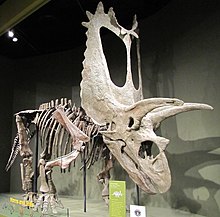Titanoceratops
|
Titanoceratops Temporal range: Late Cretaceous, 74.73–73.55 Ma |
|
|---|---|
 |
|
| Holotype erroneously labeled as and frill restored after Pentaceratops | |
| Scientific classification | |
| Kingdom: | Animalia |
| Phylum: | Chordata |
| Class: | Reptilia |
| Clade: | Dinosauria |
| Order: | †Ornithischia |
| Family: | †Ceratopsidae |
| Subfamily: | †Chasmosaurinae |
| Tribe: | †Triceratopsini |
| Genus: |
†Titanoceratops Longrich, 2011 |
| Type species | |
|
Titanoceratops ouranos Longrich, 2011 |
|
Titanoceratops (/taɪtænjoʊsɛrætɒps/ meaning "titanic horn face") is a genus of herbivorous ceratopsian dinosaur. It was a giant chasmosaurine ceratopsian that lived during the Late Cretaceous period (late Campanian, 74.7–73.5 Ma, although it could have lived as late as 72.82 Ma) in what is now New Mexico, and the earliest known member of Triceratopsini. It was named in 2011 by Nicholas R. Longrich for a specimen previously thought to belong to Pentaceratops. Titanoceratops was named for its giant skull, and the type species was named T. ouranos, after the father of the Greek titans.
It is known solely from the holotype OMNH 10165, a partial skeleton including a mostly complete skull and jaws. The skeleton has a reconstructed skull measuring 2.65 metres (8.7 ft) long, which makes it an easy candidate for the longest skull of any land vertebrate. With an estimated weight of 6.55 tonnes (6.45 long tons) and length of 6.8 metres (22.3 ft), Titanoceratops can compare to the giant sizes of Torosaurus and Triceratops.
...
Wikipedia
